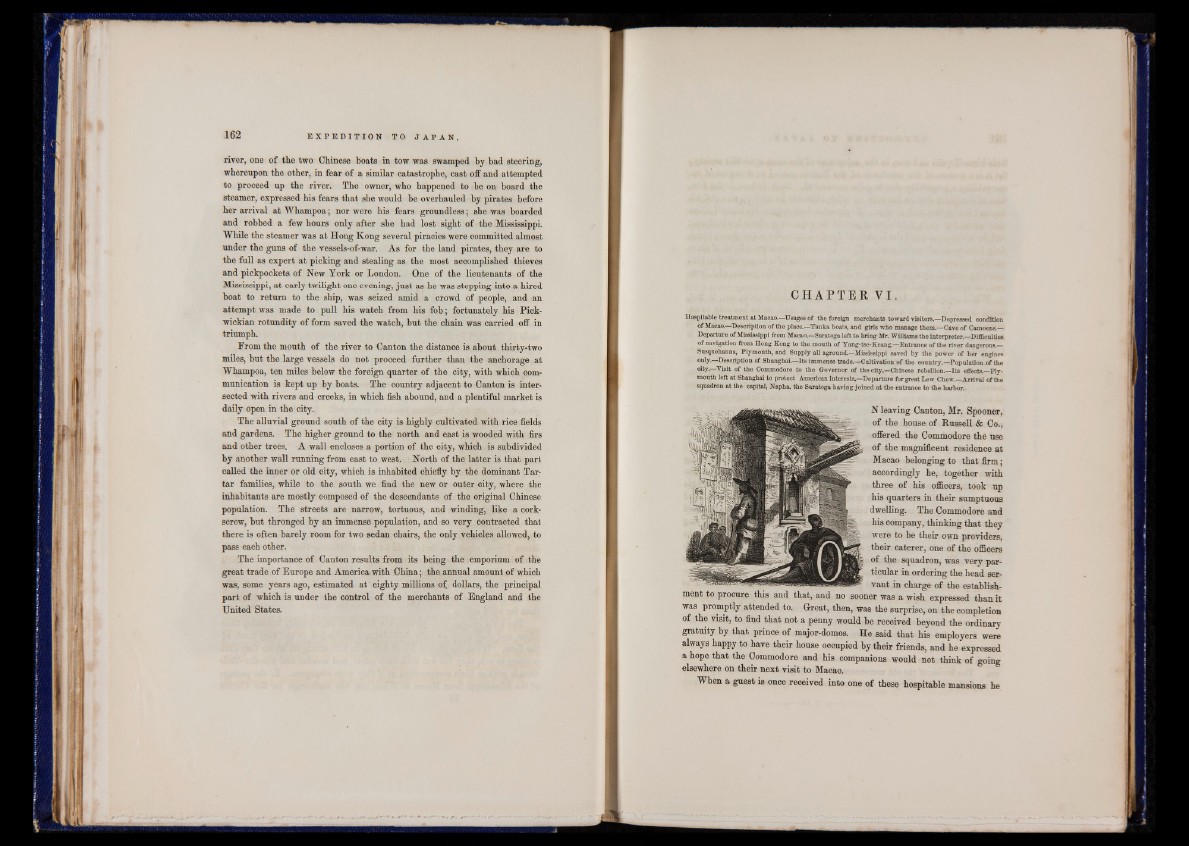
river, one of the two Chinese boats in tow was swamped by bad steering,
whereupon the other, in fear of a similar catastrophe, cast off and attempted
to proceed up the river. The owner, who happened to be on board the
steamer, expressed his fears that she would be overhauled by pirates before
her arrival at Whampoa; nor were his fears groundless; she was boarded
and robbed a few hours only after she had lost sight of the Mississippi.
While the steamer was at Hong Kong several piraoies were committed almost
under the guns of the vessels-of-war. As for the land pirates, they are to
the full as expert at picking and stealing as the most accomplished thieves
and pickpockets of New York or London. One of the lieutenants of the
Mississippi, at early twilight one evening, just as he was stepping into a hired
boat to return to the ship, was seized amid a crowd of people, and an
attempt was made to pull his watch from his fob; fortunately his Pickwickian
rotundity of form saved the watch, but the chain was carried off in
triumph.
Prom the mouth of the river to Canton the distance is about thirty-two
miles, but the large vessels do not proceed further than the anchorage at
Whampoa, ten miles below the foreign quarter of the city, with which communication
is kept up by boats. The country adjacent to Canton is intersected
with rivers and creeks, in which fish abound, and a plentiful market is
daily open in the city.
The alluvial ground south of the city is highly cultivated with rice fields
and gardens. The higher ground to the north and east is wooded with firs
and other trees. A wall encloses a portion of the city, which is subdivided
by another wall running from east to west. North of the latter is that part
called the inner or old city, which is inhabited chiefly by the dominant Tartar
families, while to the south we find the new or outer city, where the
inhabitants are mostly composed of the descendants of the original Chinese
population. The streets are narrow, tortuous, and winding, like a corkscrew,
but thronged by an immense population, and so very contracted that
there is often barely room for two sedan chairs, the only vehicles allowed, to
pass each other.
The importance of Canton results from its being the emporium of the
great trade of Europe and America with China; the annual amount of which
was, some years ago, estimated at eighty millions of dollars, the principal
part of which is under the control of the merchants of England and the
United States.
CHAPTER VI
Hospitable treatment at Macao.—Usages of the foreign merchants toward visitors.—Depressed condition
of Macao. Description of the place.—Tanka boats, and girls who manage them.—Cave of Camoena—
Departure of Mississippi from Macao.—Saratoga left to bring Mr. Williams the interpreter.—Difficulties
of navigation from Hong Eong to the month of Vang-tso-Xeang.—Entrance of the river dangerous.—
Susquehanna, Plymouth, and Supply all aground.—Mississippi saved hy the power of her engines
only.—Description of Shanghai.—Its immense trade—Cultivation of the country.—Population of the
city.—Visit of the Commodore to the Governor of the city.—Chinese rebellion.—Its effects.—Plymouth
left at Shanghai to protect American interests,—Departure for great Lew Chew.—Arrival of the
squadron at the capital, Napha, the Saratoga having joined a t the entrance to the harbor.
N leaving Canton, Mr. Spooner,
of the house of Russell & Co.,
offered the Commodore the use
of the magnificent residence at
Macao belonging to that firm ;
accordingly he, together with
three of his officers, took up
his quarters in their sumptuous
dwelling. The Commodore and
his company, thinking that they
were to be their own providers,
their caterer, one of the officers
of the squadron, was very particular
in ordering the head servant
in charge of the establishment
to procure this and that, and no sooner was a wish expressed than it
was promptly attended to. Great, then, was the surprise, on the completion
of the visit, to find that not a penny would be received beyond the ordinary
gratuity by that prince of major-domos. He said that his employers were
always happy to have their house occupied by their friends, and he expressed
a hope that the Commodore and his companions would not thint- of going
elsewhere on their next visit to Macao.
When a guest is once received into one of these hospitable mansions he